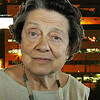Nancy G. Siraisi
Author of Medieval and Early Renaissance Medicine: An Introduction to Knowledge and Practice
About the Author
Nancy G. Siraisi is Professor of History at Hunter College and the Graduate School of the City University of New York.
Works by Nancy G. Siraisi
Medieval and Early Renaissance Medicine: An Introduction to Knowledge and Practice (1990) 159 copies, 1 review
History, Medicine, and the Traditions of Renaissance Learning (Cultures of Knowledge in the Early Modern World) (2007) 10 copies
Communities of Learned Experience: Epistolary Medicine in the Renaissance (Singleton Center Books in Premodern Europe) (2012) 8 copies
Avicenna in Renaissance Italy : the Canon and medical teaching in Italian universities after 1500 (1987) 5 copies
Associated Works
Historia: Empiricism and Erudition in Early Modern Europe (Transformations: Studies in the History of Science and… (2005) — Editor, some editions — 25 copies, 1 review
Generation and Degeneration: Tropes of Reproduction in Literature and History from Antiquity through Early Modern… (2001) — Contributor — 20 copies, 1 review
The Scientific Enterprise in Antiquity and Middle Ages: Readings from Isis (1996) — Contributor — 14 copies
Tagged
Common Knowledge
- Canonical name
- Siraisi, Nancy G.
- Legal name
- Siraisi, Nancy Gillian
- Birthdate
- 1932
- Gender
- female
- Nationality
- UK
USA - Birthplace
- Catterick, North Yorkshire, England, UK
- Places of residence
- Brooklyn, New York, USA
- Education
- University of Oxford (BA|1953|MA|1958)
City University of New York (Ph.D|1970) - Occupations
- historian of science and medicine
professor - Relationships
- Siraisi, Nobuyuki (spouse)
- Organizations
- Hunter College, City University of New York
- Awards and honors
- MacArthur Fellow (2008)
George Sarton Medal (2003)
American Philosophical Society (1997)
Fellow, Medieval Academy of America (1991) - Short biography
- Nancy Siraisi is a historian of medicine whose erudite and insightful works have opened up new areas of inquiry within medieval and Renaissance history. Whereas most studies of the period have focused almost exclusively on the influence of ancient Greek and medieval Arabic manuscripts on Renaissance medicine, Siraisi considers a much broader context in her analyses of texts written by and about medical practitioners. Her meticulously researched volumes elucidate the historical milieu in which the physicians lived and the profound impact of medical theory and practice on Renaissance society, culture, and religion. For instance, her lively account of the life and career of Taddeo Alderotti, one of Bologna’s most illustrious physicians, and his students explores the interaction between physicians’ participation in the intellectual life of medieval Italy and the development of medical theory in the 13th and early 14th centuries. By concentrating on medicine in her biography of the 16th-century polymath Girolamo Cardano — who was a physician, astrologer, autobiographer, mathematician, and natural philosopher — Siraisi offers new perspectives on the history of these fields and illuminates essential aspects of Renaissance medical practice. In her most recent work, Siraisi brings her analysis up to the early modern period to examine the intersections between medicine and the wider world of learning. In particular, she demonstrates the key role physicians writing about their craft played in the emergence of history as a discipline. Regarded as a leading scholar of the field in the U.S. and Europe, Siraisi continues to provide contributions to the evolving scholarly understanding of medical history and, specifically, Renaissance intellectual history.
Nancy Siraisi received a B.A. (1953) and an M.A. (1958) from the University of Oxford and a Ph.D. (1970) from the City University of New York. She was a professor of history at Hunter College (1970-2003) and the Graduate Center (1976-2003) at the City University of New York. Siraisi is the author of several books, including Taddeo Alderotti and His Pupils (1981), Medieval and Early Renaissance Medicine (1990), and History, Medicine, and the Traditions of Renaissance Learning (2007).
http://www.macfound.org/fellows/811/
Members
Reviews
Awards
You May Also Like
Associated Authors
Statistics
- Works
- 9
- Also by
- 3
- Members
- 213
- Popularity
- #104,444
- Rating
- 3.6
- Reviews
- 1
- ISBNs
- 20
- Languages
- 1











The topics are well covered but I was surprised by what was left out. Early on Siraisi states that she will not cover the origin of hospitals. From a medieval perspective this is somewhat understandable however for someone with a twenty first century perspective this is unacceptable. We cannot think of medical care without thinking of hospitals. Even though that was not their primary purpose in medieval times they did evolve into it and their origins need to be covered. Normally I feel religion is given to much attention is medieval histories but here I feel just the opposite. Siraisi mentions restrictions placed on the the clergy to prevent them from performing some medical procedures but completely overlooks several religious orders that were founded in the era she covers simply to tend to ill. Telling of the 11th century Knights Hospitaller, for one example, would have helped fill the hole in the coverage of the eras medical practices.
Although I can’t give thing book my unqualified recommendation it is certainly worth reading if it is all that is available. The book contains many illustrations taken from period medical texts that would have be very helpful. Unfortunately I read the Kindle edition and the illustrations were so poorly reproduced that it rendered them worthless. The bibliography is very helpful, Siraisi has limited the list to English translations of the Latin texts she researched, acknowledging the limited ability of most undergraduate students to read Latin. Most of my reservations have already been stated, there are holes in its coverage. It is also 22 years old as I write this and although our knowledge of medieval medical practices does not change rapidly there will be newer ideas in more recent volumes.… (more)